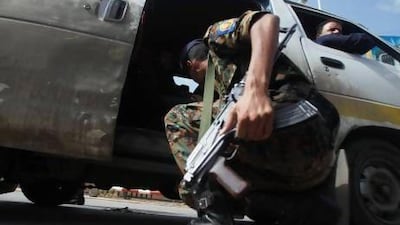SANAA // Yemen's government thwarted an audacious terrorist plot to kidnap foreign workers and take control of the country's oil facilities.
It is the first indication of the nature of the threat posed by Al Qaeda that prompted the closure of US diplomatic missions in Yemen and across the region since Sunday.
Al Qaeda in the Arabian Peninsula had planned to seize oil and gas export facilities in Yemen on Sunday, said Rajeh Badi, a spokesman for the prime minister's office.
The plot also involved smuggling explosives into Sanaa on Sunday to carry out attacks in the capital, and was uncovered with western and Arab help, Mr Badi said.
He said the information about the plot began reaching Yemeni security authorities in early July, with chatter intensifying two weeks ago. The militants planned to disguise themselves in army uniforms to carry out the raids on the Mina Al Dhaba oil export terminal in Hadramout, the Balhaf gas export facility and the city of Al Mukalla.
"The government is keeping all its pipelines and shores well guarded knowing that Al Qaeda will try to damage the economic situation of the country," Mr Badi said. The terrorists had planned to destroy the pipelines, he said.
Yemen has been on alert for five days after the US intercepted communications among militants, including an attack order from Al Qaeda leader Ayman Al Zawahiri.
Yemeni forces, with the help of the US, have over the past 18 months pushed back the Aqap insurgency in the country. But drone operations have increased recently and a strike that killed six suspected militants in the south of the country yesteday was the second in Shabwa province this week and the fifth countrywide in two weeks.
Only one of the suspected militants was identified and he was not on the government's terror watch list, a Yemeni official said.
The strike in Shabwa comes two days after Britain evacuated its embassy staff and the US state department issued a travel warning calling on all Americans in Yemen to leave the country.
The evacuation forced the closure of sections of Sanaa international airport yesterday morning. Airport management received government orders to give priority to foreign passengers.
France, meanwhile, announced that its embassy in Yemen would remain closed for at least four more days.
Mr Badi said western countries had assured his government that the embassies will reopen after the Eid Al Fitr holiday.
Hundreds of additional security forces have been deployed in the streets of the capital and armoured vehicles have been stationed outside government institutions and foreign missions.
But the Al Qaeda threat is affecting other parts of the country and forcing authorities to deploy more forces across yemen.
The Yemen coast guard is on high alert in the Gulf of Aden. "With all the focus on Sanaa, we can't forget that Aden is the business capital and also neighbouring the previous Al Qaeda controlled province of Abyan," a senior coastguard official said.
Although the Yemeni authorities have assisted foreigners wanting to leave the country, the government has expressed disappointment over the evacuation advice.
"While the government of Yemen appreciates foreign governments' concern for the safety of their citizens, the evacuation of embassy staff serves the interests of the extremists and undermines the exceptional cooperation between Yemen and the international alliance against terrorism," it said.
Experts also warned that the drone programme could bolster Al Qaeda's strength.
"When civilians die from drone strikes, Al Qaeda recruits. With every civilian death Al Qaeda recruits many more fighters," said Abdul Razzak Al Jamal, an independent researcher.
* Additional reporting by Reuters
twitter: For breaking news from the Gulf, the Middle East and around the globe follow The National World. Follow us

